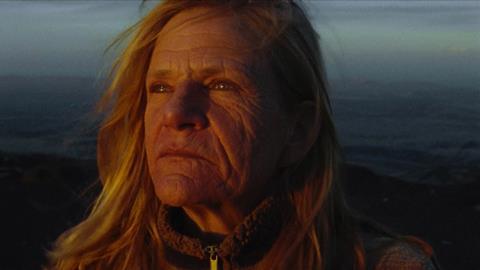Dale Dickey and Wes Studi’s intimate performances anchor arthouse debut

Dir/scr: Max Walker-Silverman. US. 2022. 81 mins
Living alone in a rudimentary caravan parked in plot number seven on the edge of a lake in Colorado, Faye’s life has been stripped back to its essentials. A widow in her sixties, she catches crawfish, boils a pot of instant coffee and waits, for a man she’s not even sure she will recognise. His name is Lito, and he was her childhood sweetheart many decades ago. Like her, he is widowed and lonely. And for one day and a night, they share a connection in this subdued but affecting drama which showcases both a stark and striking backdrop and a pair of lovely, intimate performances from character actors Dale Dickey and Wes Studi.
A Love Song has thematic similarities with Chloe Zhao’s Nomadland
The first feature from Max Walker-Silverman, who won the Special Jury Prize at SXSW 2020 for his short film Chuj Boys Of Summer, A Love Song has thematic similarities with Chloe Zhao’s Academy Award winning Nomadland, and in particular, with Robin Wright’s portrait of off-grid grief, Land, which premiered at last year’s Sundance. But in contrast to Wright’s photogenic version of a survivalist lifestyle, A Love Song is more sparse and meditative, a film which embraces and accepts the empty spaces in the landscape, in Faye’s life and in the conversations she shares with Lito and with fellow campers on the far side of the lake. Further festival interest seems likely, and the film could find a home with an arthouse distributor or streaming platform.
Although the scenes that Faye shares with other characters are quietly powerful, ultimately it is Dickey’s film. Her nuanced, lived in performance as Faye provides a rewarding character study which tells us as much, if not more, about her when she is alone as it does when she is with other people.
Faye’s existence borders on the ascetic. She owns two books, one for the day (’A Field Guide to North American Birds’) and one for the long empty evenings (’A Field Guide To The Night Sky’). Her meals are a daily routine of catching and cooking crustaceans from the lake, eaten on a rickety camping table with a view of the mountains. When two fellow campers invite her over for a meal, she hesitates, temporarily unable to understand how social interaction might fit into her pared down lifestyle. For Faye, there’s an awful lot riding on the reconnection with Lito. It was she, we learn, who reached out to him by letter some weeks previously. And now she waits, unsure of his reaction and of who he even is by now. A lifetime has passed since they knew each other.
Walker-Silverman deliberately unmoors the story temporally. There’s a mention of a shared school trip in 1970 which suggests that the reunion between Faye and Lito occurs in the present day. But technology is stripped from the story: Faye’s connections to the world outside come through letters delivered by a postman and his pony, and a transistor radio which she tunes at random, stumbling on the perfect song each time. The look of the picture adds to the quasi-nostalgic quality – it was shot on film, with a colour palette which accentuates the tawny sun-baked hues in the landscape and in the wood and Formica-lined caravan that Faye calls her home. She is, in every sense, living in the past. And the unassuming power of Dickey’s performance means that we are fully invested in the question of whether Faye will stay stuck in her wilderness or finally start moving forward again.
Production company: Cow Hip Films cowhipfilms@gmail.com; Fit Via Vi Film Productions, Macpac Entertainment, Present Company
International sales: Cinetic Media julie@cineticmedia.com (US); Films Boutique info@filmsboutique.com
Producers: Dan Janvey, Jesse Hope, Max Walker-Silverman
Editing: Affonso Gonçalves, Max Walker-Silverman
Cinematography: Alfonso Herrera Salcedo
Production design: Juliana Barreto Barreto
Music: Ramzi Bashour
Main cast: Dale Dickey, Wes Studi, Michelle Wilson, Benja K. Thomas, John Way, Marty Grace Dennis.















![[L-R]: Amanda Villavieja, Laia Casanovas, Yasmina Praderas](https://d1nslcd7m2225b.cloudfront.net/Pictures/274x183/6/4/1/1471641_pxl_20251224_103354743_618426_crop.jpg)








